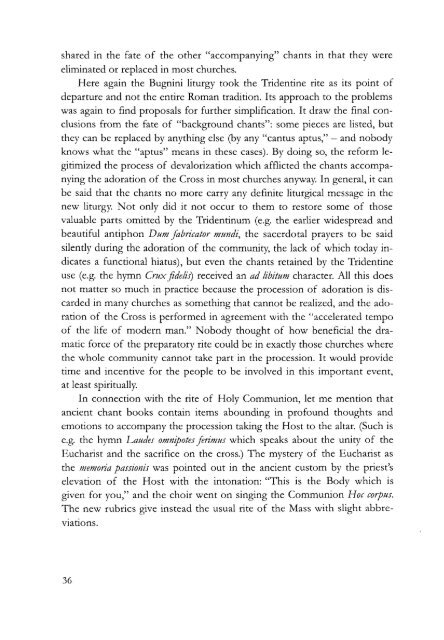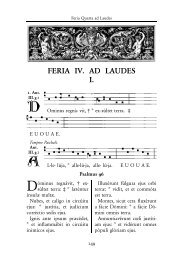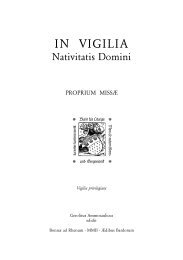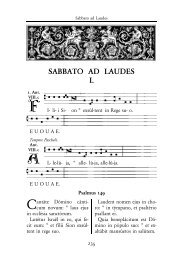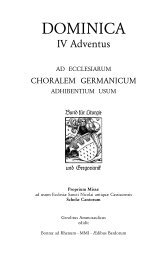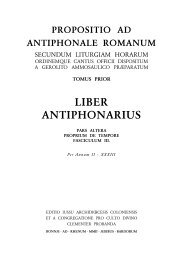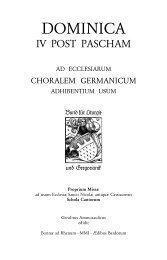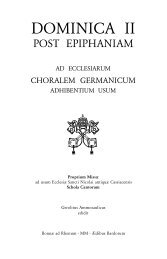The Bugnini-Liturgy and the Reform of the Reform - MusicaSacra
The Bugnini-Liturgy and the Reform of the Reform - MusicaSacra
The Bugnini-Liturgy and the Reform of the Reform - MusicaSacra
Create successful ePaper yourself
Turn your PDF publications into a flip-book with our unique Google optimized e-Paper software.
shared in <strong>the</strong> fate <strong>of</strong> <strong>the</strong> o<strong>the</strong>r "accompanying" chants in that <strong>the</strong>y were<br />
eliminated or replaced in most churches.<br />
Here again <strong>the</strong> <strong>Bugnini</strong> liturgy took <strong>the</strong> Tridentine rite as its point <strong>of</strong><br />
departure <strong>and</strong> not <strong>the</strong> entire Roman tradition. Its approach to <strong>the</strong> problems<br />
was again to find proposals for fur<strong>the</strong>r simplification. It draw <strong>the</strong> final conclusions<br />
from <strong>the</strong> fate <strong>of</strong> "background chants": some pieces are listed, but<br />
<strong>the</strong>y can be replaced by anything else (by any "cantus aptus," — <strong>and</strong> nobody<br />
knows what <strong>the</strong> "aptus" means in <strong>the</strong>se cases). By doing so, <strong>the</strong> reform legitimized<br />
<strong>the</strong> process <strong>of</strong> devalorization which afflicted <strong>the</strong> chants accompanying<br />
<strong>the</strong> adoration <strong>of</strong> <strong>the</strong> Cross in most churches anyway. In general, it can<br />
be said that <strong>the</strong> chants no more carry any definite liturgical message in <strong>the</strong><br />
new liturgy. Not only did it not occur to <strong>the</strong>m to restore some <strong>of</strong> those<br />
valuable parts omitted by <strong>the</strong> Tridentinum (e.g. <strong>the</strong> earlier widespread <strong>and</strong><br />
beautiful antiphon Dum fabricator mundi^ <strong>the</strong> sacerdotal prayers to be said<br />
silently during <strong>the</strong> adoration <strong>of</strong> <strong>the</strong> community, <strong>the</strong> lack <strong>of</strong> which today indicates<br />
a functional hiatus), but even <strong>the</strong> chants retained by <strong>the</strong> Tridentine<br />
use (e.g. <strong>the</strong> hymn Crux fide/is) received an ad libitum character. All this does<br />
not matter so much in practice because <strong>the</strong> procession <strong>of</strong> adoration is discarded<br />
in many churches as something that cannot be realized, <strong>and</strong> <strong>the</strong> adoration<br />
<strong>of</strong> <strong>the</strong> Cross is performed in agreement with <strong>the</strong> "accelerated tempo<br />
<strong>of</strong> <strong>the</strong> life <strong>of</strong> modern man." Nobody thought <strong>of</strong> how beneficial <strong>the</strong> dramatic<br />
force <strong>of</strong> <strong>the</strong> preparatory rite could be in exactly those churches where<br />
<strong>the</strong> whole community cannot take part in <strong>the</strong> procession. It would provide<br />
time <strong>and</strong> incentive for <strong>the</strong> people to be involved in this important event,<br />
at least spiritually.<br />
In connection with <strong>the</strong> rite <strong>of</strong> Holy Communion, let me mention that<br />
ancient chant books contain items abounding in pr<strong>of</strong>ound thoughts <strong>and</strong><br />
emotions to accompany <strong>the</strong> procession taking <strong>the</strong> Host to <strong>the</strong> altar. (Such is<br />
e.g. <strong>the</strong> hymn Laudes omnipotes ferimus which speaks about <strong>the</strong> unity <strong>of</strong> <strong>the</strong><br />
Eucharist <strong>and</strong> <strong>the</strong> sacrifice on <strong>the</strong> cross.) <strong>The</strong> mystery <strong>of</strong> <strong>the</strong> Eucharist as<br />
<strong>the</strong> memoria passionis was pointed out in <strong>the</strong> ancient custom by <strong>the</strong> priest's<br />
elevation <strong>of</strong> <strong>the</strong> Host with <strong>the</strong> intonation: "This is <strong>the</strong> Body which is<br />
given for you," <strong>and</strong> <strong>the</strong> choir went on singing <strong>the</strong> Communion Hoc corpus.<br />
<strong>The</strong> new rubrics give instead <strong>the</strong> usual rite <strong>of</strong> <strong>the</strong> Mass with slight abbreviations.<br />
36


